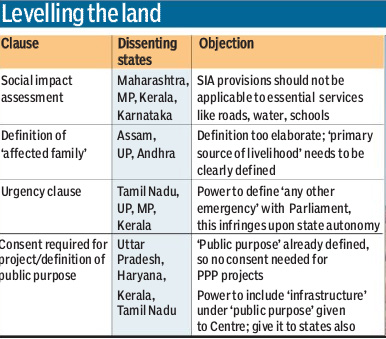With major states including those ruled by parties outside the ruling alliance raising objections to a host of unworkable provisions in the new Land Acquisition Act, the Modi government has put the Act, which came into force just six months ago, under a comprehensive review.
Although there are minor differences among the states on the amendments needed in the Act or the emphasis given to resolution of any particular issue, their proposals nevertheless reflect a broad political consensus on the need to make the Act more investor-friendly. This would make it easier for the government, which is in a minority in the Rajya Sabha, to carry out the amendments.
Even if the Congress, the proponent of the Act, refuses to support the changes, other major parties outside the government like the AIADMK, with 11 members in the Upper House, and the Samajwadi Party, with 10, could come to the rescue of the government. Congress-ruled states including Maharashtra, Assam and Kerala have also sought major relaxations of the consent and social impact assessment (SIA) clauses.





Rural development minister Nitin Gadkari, sources said, has already sent a note to the Prime Minister?s Office (PMO), indicating his view that the law be amended to make land acquisition less cumbersome for industry.
The move, which could gather pace in the next few weeks with inter-party dialogues, could primarily result in a major dilution of the restrictive consent clause for public-private partnership (PPP) projects and limit the mandatory SIA to only projects above an investment threshold.
The idea is to try and make the changes in the current session of Parliament.
A broadening of the ?urgency clause? under which land can be acquired compulsorily for the purposes of defence/ national security or in the event of natural calamities is likely. However, it remains to be seen if the states? demand that they also be allowed to invoke this clause be met. Currently, only the Centre can decide whether a situation demands use of the urgency clause.
The review could also lead to a narrower definition of affected families eligible for rehabilitation and resettlement ? for this, the term ?primary source of livelihood? could be revised to reduce its scope, sources added.
These industry-friendly relaxations in the land Act, coupled with easing of labour norms for specific sectors could give a boost to the manufacturing and infrastructure sectors that have also received a lot of incentives in the recent Union Budget.
FE on Tuesday reported the plans to relax Mines Act to provide more flexibility to oil companies in deploying workers ?on and off? oil blocks and amend the Industrial Disputes Act to make retrenchment of workers in the National Investment Manufacturing Zones easier.
Industry has been up in arms against the Right to Fair Compensation and Transparency in Land Acquisition, Rehabilitation and Resettlement Act, 2013. It feels the elaborate requirements of local peoples? consent stipulated in the law have, for the short period of its existence, proven to be onerous. The new law, Confederation of Indian Industry, has said, jacked up land acquisition cost by three times, rendering projects unviable and thwarting investments.
Uttar Pradesh and Madhya Pradesh, two of the country’s largest states, have asked for doing away with the ?consent clause? for PPP projects as the land is taken only for those projects that serve ?public purpose?. While Gujarat government has also asked for ?re-look? at the consent provisions, Haryana has proposed that either it be abolished or the consent requirement could be only of 50% of the affected people. States such as Chhattisgarh and Kerala too have asked for re-examining the provision.
The Act stipulates mandatory consent of at least 70% of the affected people for acquiring land for PPP projects and 80% for private companies involving projects serving public purpose.
Uttar Pradesh, Gujarat, Chhattisgarh, Karnataka, Madhya Pradesh and Maharashtra have asked for abolition of SIA and public hearing, saying these could lead to delays in industrial projects.
In general, however, states have not opposed the compensation amounts prescribed in the law ? double the market value of the land in urban areas and four times in rural areas, although Kerala, being an evenly urbanised state, said the disparity could lead to disputes.
Madhya Pradesh and Kerala have asked for abolition of impact assessment in the case of small projects like road widening, construction of new roads, canals and schools.
States have also asked for scaling down the ?retrospective clause?, (which allowed higher compensation for land acquired five years before the implementation of the new Act but compensation hasn’t been paid), saying this could lead to litigation. The provision which stipulates that land acquisition proceeding would lapse in case compensation is not paid or physical possession is not taken should be modified, the states said.















